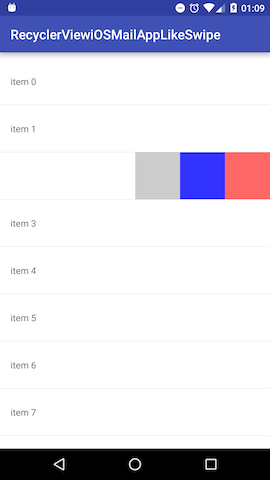Yet another adapter delegate library.
repositories {
...
maven { url 'https://jitpack.io' }
}
...
dependencies {
implementation("com.github.Miha-x64:Delegapter:-SNAPSHOT")
}
ViewHolder
We use our own ViewHolder class (called just VH) for a bunch of reasons:
RecyclerView.ViewHolderis abstract, but it's sometimes necessary to create a “dumb” holder without any special fields or behaviour, thusVHisopen- There's
RecyclerView.ViewHolder.itemView: View, butVHis generic, and has a propertyVH<V, …>.view: V - When using viewBinding, all
ViewHolders look the same: they havebindingfield.VHsupports an attachment of any type which is typicallyViewBinding:VH<*, B, …>.binding: B - Delegapter needs to tie certain
ViewHoldertype with the corresponding data type for type safety:VH<V : View, B, D> - Therefore,
VH<*, *, D>has its ownbind(D)method which is a common practice (but not forced by the library)
There's a lot of factory functions for creating ViewHolders:
VH(TextView(parent.context).apply {
layoutParams = RecyclerView.LayoutParams(MATCH_PARENT, WRAP_CONTENT)
fontRes = R.font.roboto
textSize = 17f
}, TextView::setText) // VH<TextView, Nothing?, CharSequence>
inflateVH(parent, ItemUserBinding::inflate) { user: User ->
imageLoader.load(user.photo).into(photoView)
nameView.text = user.name
} // VH<View, ItemUserBinding, User>
// and more…
Delegate
Delegate is just a ViewHolder factory:
typealias Delegate<D> = (parent: ViewGroup) -> VH<*, *, D>
VH::V and VH::B are actually implementation details of a certain VH, Delegapter does not need them after instantiation, thus <*, *.
A typical Delegate declaration looks like this:
val userDelegate = ::userHolder
private fun userHolder(parent: ViewGroup): Delegate<User> =
inflateVH(…) { … }
In this example, userDelegate property guarantees object identity (::userHolder expression could give out different instances between invocations). You can just write val userDelegate = { parent -> … }, of course, but method reference, unlike lambda, gives meaningful toString() and helps debugging.
Delegapter
Delegapter is basically a list of (item, delegate) tuples, but their type agreement is guaranteed, like it was a List<<D> Pair<D, Delegate<D>> (non-denotable type in Java/Kotlin).
Delegapter is not an Adapter itself, just a special data structure. Let's use base VHAdapter for convenience:
class SomeAdapter : VHAdapter<VH<*, *, *>>() {
init { stateRestorationPolicy = … }
private val d = Delegapter(this /* pass self to get notified */)
override fun getItemCount(): Int =
d.size
override fun getItemViewType(position: Int): Int =
d.viewTypeAt(position)
override fun onCreateViewHolder(parent: ViewGroup, viewType: Int): VH<*, *, *> =
d.createViewHolder(parent, viewType)
override fun onBindViewHolder(holder: VH<*, *, *>, position: Int, payloads: List<Any>): Unit =
d.bindViewHolder(holder, position, payloads)
fun update(data: Data) {
d.clear()
d.add(data.header, headerDelegate)
d.addAll(data.recommended, recommendationDelegate)
d.addAll(data.posts, postDelegate)
// use autocomplete to see all available functions
}
}
This gives you some flexibility for advanced usage scenarios:
- Insert items not handled by Delegapter (headers, footers, ads
🤮 ). (Instead of passingthisto the constructor, use customListUpdateCallbackimplementation to correctnotify*()calls.) - Filter out some items without removing them. (This requires a corrected
ListUpdateCallback, too.) - Use several Delegapters in a single Adapter (IDK why but this should happen at some point).
In order to share RecycledViewPool between several RecyclerViews, you need to preserve the same viewType to Delegate mapping across adapters. This can be achieved using “parent” Delegapter:
val delegapterFather = Delegapter(NullListUpdateCallback)
…
class SomeAdapter : RecyclerView.Adapter<…>() {
private val d = Delegapter(this, delegapterFather)
…
}
Apart from skeletal VHAdapter, there are two more: RepeatAdapter and SingleTypeAdapter. They don't use Delegapter but employ VH and Delegate for the ease of use.
ItemDecoration
Decorating different viewTypes is a stressful job. Here's how Delegapter helps you to add spaces between items of certain types:
data.decor(RecyclerView.VERTICAL) {
// keep 16dp after title, before user
between({ it === headerDelegate }, { it === userDelegate }, spaceSize = 16f)
// keep 30dp between any two users
between({ it === userDelegate }, spaceSize = 30f)
// text units for text items!
between({ it === textDelegate }, spaceSize = 16f, spaceUnit = COMPLEX_UNIT_SP)
}
Predicates like { it === headerDelegate } look clumsy but are very flexible because you can check for several conditions there, for example, match any type ({ true }) or check for external conditions ({ useTextSpaces && it === textDelegate }).
Any tool can make you happy until it works fine. And make you hate your job when something gets screwed up. A virtue of any abstraction level is an ability to peek into and see what actually happens. If you feel sad, just pass some booleans around: decor(orientation, debugDelegates = true, debugSpaces = true). This will show you which delegate is used for each item (that's where ::function.toString() helps!), or highlight spaces, accordingly.







